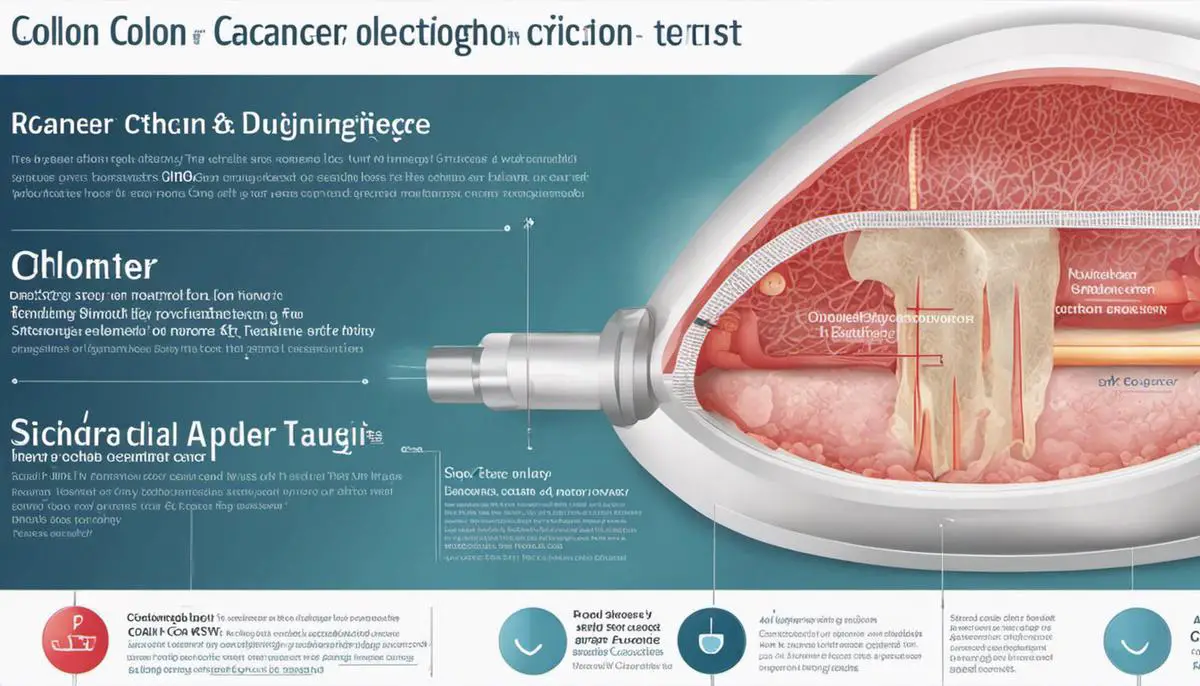Delving into the state of our physical health and understanding the intimations our bodies give us is paramount in living a fulfilling, healthy life. A common yet frequently disregarded symptom, abdominal discomfort, houses various subtle signals—one of them possibly being an early marker of a prevalent ailment like colon cancer. This discourse aims to shed light on the signs and symptoms of abdominal discomfort along with an extensive analysis on colon cancer, a public health concern that is often under the radar. Additionally, this piece will connect the dots between the discomfort and colon cancer, leading us to comprehend that continual abdominal pain could be indicative of a more serious underlying issue. Ultimately, arming ourselves with the right knowledge, understanding the importance of early detection, and making a conscious effort towards leading a healthier lifestyle can play a considerable role in colon cancer prevention.
Recognizing Abdominal Discomfort
Abdominal Discomfort: Common and Diverse Causes
Abdominal discomfort is a widespread symptom faced by many individuals at some point in their lives. It can result from a multitude of conditions ranging from minor, temporary issues to more severe, long-term health concerns. Common causes include overeating, food intolerance, or reactions to specific substances or medications.
Temporary vs. Persistent Abdominal Pain
Temporary abdominal discomfort, usually caused by non-serious issues like overeating, gas, or mild viral infections, typically subsides within a short period, rarely exceeding two days. However, persistent pain that lasts for several days may signify more serious conditions. This category can include conditions such as gastrointestinal disorders, gallstones, kidney stones, diverticulitis, or appendicitis. It’s always important to seek medical attention if your discomfort persists or if you are experiencing severe pain, to ensure proper diagnosis and treatment.
Chronic Health Conditions and Abdominal Discomfort
Certain chronic health conditions can also contribute to chronic abdominal pain. Conditions such as chronic pancreatitis, chronic cholecystitis (gallbladder inflammation), and inflammatory bowel disease (IBD) – including Crohn’s disease and ulcerative colitis – often present with persistent abdominal discomfort. Pain severity and location can vary widely, so a healthcare provider should always evaluate chronic abdominal pain.
Colon Cancer: A Serious Cause of Abdominal Discomfort
Colon cancer is among the potential causes of continuous abdominal discomfort. Colon cancer often presents without symptoms in its early stages, but as the disease progresses, symptoms such as persistent abdominal discomfort or changes in bowel habits can occur. The pain associated with colon cancer may vary in intensity and may be constant or come and go.
Recognizing Colon Cancer Symptoms
In addition to abdominal discomfort, other symptoms that may indicate colon cancer include rectal bleeding, changes in bowel habits, unexplained weight loss, fatigue, and weakness. It’s critical to take note of these symptoms and discuss them with your healthcare provider as they may indicate the need for further diagnostic testing, potentially including a colonoscopy. Early detection of colon cancer significantly improves treatment success rates.
The Importance of Regular Screening
Because early-stage colon cancer often presents without symptoms, regular screening is essential, particularly for individuals with known risk factors such as age (50 years and older), a personal or family history of colon cancer or colon polyps, certain genetic syndromes, a history of inflammatory bowel disease (Crohn’s disease or ulcerative colitis), or lifestyle factors like diet, obesity, smoking, and physical inactivity. Regular screenings can catch precancerous polyps before they develop into cancer, or catch colon cancer in its early stages when it’s most treatable.
Recognizing the Need for Medical Consultation
Anytime you suffer from consistent abdominal discomfort, it’s crucial to reach out to a healthcare professional. The usual initial course of action is to conduct a thorough medical history review and physical examination to pinpoint the source of your discomfort. Depending on your symptoms and medical history, your provider could suggest more tests. If there are concerns about the possibility of colon cancer, expect your healthcare provider to recommend further diagnostic procedures such as a colonoscopy. This helps in making an accurate diagnosis and deciding the most effective treatment strategy. Remember, for conditions like colon cancer, early detection and treatment can significantly improve the prognosis.

Photo by towfiqu999999 on Unsplash
Introduction to Colon Cancer
Understanding Colon Cancer
Colorectal cancer, often simply called colon cancer, is a malignant disease primarily affecting the cells that line the colon and rectum — the terminal parts of the digestive tract responsible for waste elimination. Cancer typically arises when cells start to grow aberrantly, creating a formation known as a tumor. The danger lies in malignant tumors, unlike benign ones, since they possess the ability to spread and proliferate in other regions of the body, thus increasing their harm potential.
Causes and Risk Factors
While the exact cause of colon cancer may not be specifically known, certain aspects have been identified as contributing risk factors. Age is one of the prominent factors since colon cancer is more common in people over 50. A sedentary lifestyle, diet low in fruit and vegetables, high alcohol consumption, smoking, and obesity are lifestyle factors that increase the risk.
Additionally, certain genetic disorders like familial adenomatous polyposis (FAP) and hereditary non-polyposis colon cancer (Lynch syndrome) significantly heighten the risk. Also, people with a personal or family history of colorectal cancer or benign (not cancerous) colorectal polyps are more likely to get this disease.
Stages of Colon Cancer
The stage of the colon cancer refers to how far the cancer has spread. Stage I is the earliest stage, where cancer has grown into the inner layer of the colon but hasn’t spread beyond the colon wall or rectum. Stage II and III denote cancer growth into or through the wall of the colon and spread to nearby lymph nodes. Stage IV signifies that the cancer has metastasized to other parts of the body such as the liver, lungs or even distant lymph nodes.
Prevalence of Colon Cancer
Recent statistics elucidate the significant incidence of colon cancer. It is the third most common cancer diagnosed in both men and women in the United States. According to the American Cancer Society, there will be about 104,270 new cases of colon cancer in 2021, demonstrating the gravity of the situation.
Abdominal Discomfort and Colon Cancer
One of the symptoms of colon cancer includes discomfort in the abdomen, which may present as persistent cramping, pain, bloating, or fullness. This discomfort could sometimes be misread or overlooked as general digestive issues. However, when accompanied by other signs like rectal bleeding, unexplained weight loss, change in bowel habits, or fatigue, it should be taken seriously as a potential indication of colon cancer. Individuals experiencing these symptoms should consult a doctor promptly for proper diagnosis and early treatment.
How Your Lifestyle Choices Influence Colon Cancer Risk
Making conscious decisions about your lifestyle can significantly alter your risk of colon cancer. Consuming a diet high in red and processed meats can escalate your risk, whereas intake of fruits, vegetables, and whole grains can aid in reducing it. Leading an active life and keeping your weight in check also diminishes the risk. However, certain behaviors such as moderate to excessive alcohol consumption and smoking can be harmful, as they have been linked to an increased likelihood of developing the disease.
Apprehending the connections between colon cancer and certain lifestyle choices is critical in making informed decisions for your health and recognizing symptoms early on, which can further lead to prompt diagnosis and efficient treatment.

Link between Abdominal Discomfort and Colon Cancer
Deciphering the Link between Abdominal Discomfort and Colon Cancer
Commonly referred to as colorectal cancer, colon cancer is a specific type of cancer initiating from the large intestine, or the colon. Usually, it begins in the form of tiny, harmless (benign) cell clumps known as polyps which, over time, could transform into colon cancers. Often associated with colon cancer, persistent abdominal discomfort, particularly when accompanied by other symptoms such as changes in bowel habits or enigmatic weight loss, can serve as an early warning sign of the disease.
Abdominal Discomfort as a Symptom of Colon Cancer
Abdominal discomfort can manifest in several ways, including pain, bloating, gas, or feeling full or bloated even without eating. While these symptoms can be associated with a variety of different health issues, persistent or worsening symptoms could possibly indicate colon cancer. Colon cancer usually affects older adults, but it can happen at any age. It typically starts as small, noncancerous polyps that become cancerous over time. When these polyps grow, they can cause abdominal discomfort or pain.
Other Symptoms of Colon Cancer
Other symptoms associated with colon cancer include a persistent change in bowel habits including diarrhea or constipation, rectal bleeding or blood in the stool, persistent fatigue, and unexplained weight loss. It’s worth noting, however, that symptoms can vary depending on the cancer’s size and location in the large intestine.
Recognizing Severity and When to Consult a Doctor
Symptoms can increase in severity over time. The relativity of severity is influenced by the progression of the disease, not merely the presence of discomfort. It’s important to pay attention to your body and not disregard persistent discomfort as it could be indicative of something as serious as colon cancer.
If abdominal discomfort persists and is associated with the other symptoms stated, consulting a healthcare provider becomes necessary. In and itself, abdominal discomfort does not conclusively point towards colon cancer, but when seen along with other signs, a medical review becomes crucial.
The Prevalence of Abdominal Discomfort in Other Conditions
While abdominal discomfort can be a symptom of colon cancer, it’s important to note that there are many other potential causes. These can range from fairly benign conditions such as indigestion or gas, to more serious issues like irritable bowel syndrome (IBS) or inflammatory bowel disease (IBD). Hence, it is essential to rule out these possibilities before conclusive inferences are made regarding colon cancer.
Understanding Abdominal Discomfort in Relation to Colon Cancer
Abdominal discomfort, a frequently encountered symptom, often points to a plethora of potential health issues that may or may not be serious. Among these issues, a prominent one is colon cancer. Should you find yourself experiencing consistent abdominal discomfort, especially when coupled with other signs such as changes in bowel movements or inexplicable weight loss, it becomes imperative to seek professional medical advice. Grasping this information becomes particularly critical in light of the fact that colon cancer symptoms tend to remain elusive until the cancer has reached an advanced stage or has metastasized.

Prevention and Early Detection of Colon Cancer
The Imperative of Early Detection in Colon Cancer
Landing on an early diagnosis can drastically shift survival rates when it comes to colon cancer. The five-year survival expectations rise to as high as 90% when the cancer is detected at the nascent stage which contrasts sharply with survival rates when diagnosis occurs in a later stage. Thus it is crucial to remain aware of and understand the early signs that might be indicative of colon cancer onset. Some common symptoms include, but are not limited to, changes in bowel habits such as diarrhea, constipation or altered stool consistency persisting for over four weeks; rectal bleeding or blood presence in stool; ongoing abdominal discomfort in the form of gas or cramps; feeling of incomplete bowel emptying; generalized weakness or fatigue, and unexplained weight loss.
Importance of Regular Screenings and Tests
The American Cancer Society recommends that people at average risk of colon cancer start regular screenings at age 45. These tests can often find the disease early or even prevent it by finding and removing polyps before they turn into cancer. There are several types of screenings, including colonoscopy, computed tomographic colonography, and fecal tests. If a test reveals anything suspicious, a colonoscopy is typically used to examine the full length of the colon. Frequency of screenings depends on the specific test, medical history, and family history of colon cancer.
Lifestyle Modifications for Colon Cancer Prevention
Lifestyle changes can also play a critical role in reducing the risk of developing colon cancer. Maintaining a healthy weight, staying physically active, consuming a balanced diet rich in fruits, vegetables, and whole grains, and limiting intake of red and processed meats, can contribute towards prevention. Quitting smoking and moderating alcohol consumption are also advisable.
Importance of Healthy Diet and Regular Exercise
A diet that’s high in fruits, vegetables, and whole grains and low in red and processed meats is associated with a lower risk of colon cancer. Regular exercise can also lower the risks. Adults should aim for at least 150 minutes of moderate-intensity or 75 minutes of high-intensity activity weekly. Regular physical activity not only helps maintain a healthy weight but can also protect against a variety of diseases, including colon cancer.
Abdominal Discomfort and Colon Cancer
Abdominal discomfort can be one of the symptoms of colon cancer. This discomfort often comes in the form of cramps or a constant, vague bellyache. While abdominal discomfort can be caused by various conditions and is often harmless, persistent or severe abdominal discomfort should be taken seriously and reported to a doctor immediately, as it may be an early warning sign of colon cancer.

It remains unmistakable that our health is greatly influenced by our actions, understanding, and responsiveness to our bodies’ signals. Therefore, comprehensive knowledge and recognition of symptoms; such as the correlation between persistent abdominal discomfort and colon cancer, could potentially be lifesaving. We have delved into the essence of knowledge, preventive measures, and early detection in combating colon cancer, highlighting the important role of taking charge of our health. Reviewing these principles frequently and adapting to a healthier lifestyle can indeed create a long-lasting impact on our overall wellbeing. Appreciating the gravity of these key insights might just encourage that early medical consultation, potentially detecting colon cancer in its initial stages and significantly increasing survival rates, providing a beacon of hope in an otherwise gloomy scenario.
FAQ
What is the treatment for abdominal discomfort?
The underlying cause of abdominal discomfort, which can include gastrointestinal disorders, gynecological disorders, urinary tract issues, and more, will determine the course of treatment. It is important to pinpoint the exact cause, and a medical professional will carry out assessments and diagnostic procedures to ascertain it. Physical therapy, dietary adjustments, hydration, rest, stress management, medications for pain relief or treating the underlying condition, and, in certain situations, surgery are all possible forms of treatment. Avoid self-diagnosis and self-medication. If someone has severe or ongoing stomach discomfort or if it’s accompanied by other worrisome symptoms, they should see a doctor so that a proper diagnosis and treatment plan can be determined.
What is abdominal discomfort also known as?
Depending on its unique nature and characteristics, there are several terms or descriptions that can be used to describe abdominal discomfort. Frequently used expressions to characterize pain or discomfort in the abdomen include:
- Abdominal Pain: This is a general term for any kind of pain or discomfort felt in the abdomen.
- Stomachache: This term can refer to any type of abdominal discomfort, but it is commonly used to indicate discomfort in the upper abdomen.
- “Bellyache” is an additional colloquial term for pain or discomfort in the abdomen.
- Abdominal Cramps: an intense, squeezing pain in the abdomen that is frequently brought on by spasms in the muscles.
- The colloquial term for a range of digestive discomforts is “tummy troubles“
- Gut Pain: This term refers to any pain or discomfort experienced in the intestines and stomach as part of the gastrointestinal tract.
- Abdominal Discomfort: A broad term that includes a variety of feelings in the abdomen, from moderate discomfort to pain.
- Abdominal Tenderness: Describes heightened sensitivity or pain in the abdomen in response to pressure, and is frequently used in a medical context to characterize physical examination results.
- Abdominal Distress: A broad term that covers various digestive issues, discomfort, or uneasiness in the abdomen.
- Stomach Upset: Term used to characterize discomfort related to bloating, nausea, or an overall uneasy feeling in the abdominal region.
These terms are frequently used when discussing symptoms with healthcare providers or when seeking medical attention, as they describe the subjective experiences of people who may be experiencing abdominal discomfort or pain. Depending on how the person describes their symptoms and the situation being discussed, different terms may be used.
What is persistent abdominal discomfort?
Abdominal pain or discomfort that is continuous or recurrent and lasts longer than what would be expected for minor digestive problems or transient discomfort is referred to as persistent abdominal pain. The word “persistent” suggests that the pain doesn’t go away quickly—rather, it lasts for days, weeks, or even months. This kind of discomfort can be intermittent or continuous, mild and bothersome, moderate, or severe. Distinguishing between chronic and sporadic stomach pain, which can be caused by transient factors like overindulgence or dyspepsia, is crucial. A medical examination is frequently necessary to identify the underlying cause and the best course of action for persistent stomach discomfort. Various gastrointestinal, gynecological, urological, or other medical conditions may be the cause; finding the source of the discomfort is crucial to managing it effectively.
What does lower abdominal discomfort mean?
The nature of the discomfort and any accompanying symptoms are among the many variables that determine the meaning of lower abdominal discomfort, which can have many different causes. Intestinal problems like gas or constipation, gynecological disorders like endometriosis or menstrual cramps, urinary tract infections, reproductive health issues like early or ectopic pregnancy, musculoskeletal disorders, appendicitis, gallbladder problems, inflammatory bowel disease, trauma, anxiety, or hernias can all be contributing factors. To ensure the right diagnosis and course of treatment, the precise cause should be ascertained through a medical evaluation, particularly if the discomfort is severe, persistent, or accompanied by other concerning symptoms.
Is abdominal discomfort serious?
Abdominal discomfort’s severity varies according to its type, degree, length, and accompanying symptoms. Even though mild, transient discomfort might not be reason for concern, it is best to see a doctor for a proper evaluation and diagnosis if you have severe or persistent abdominal pain, or if it is accompanied by other worrisome symptoms. Disregarding intense or atypical stomach discomfort may result in postponing the management of potentially dangerous ailments.
